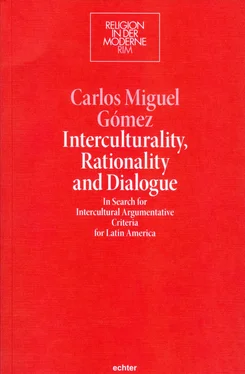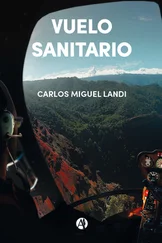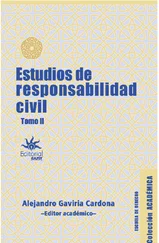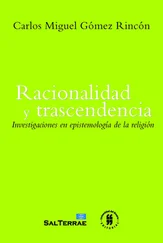Bibliography
Research is always a collective activity. The commitment and support of many people have made this investigation possible. I want to express my thanks to the Katholischer Akademischer Ausländer-Dienst (KAAD), particularly to Dr. Thomas Krüggeler and Renate Flügel, for their support which has been always much more than financial. The KAAD granted me a PhD Scholarship that allowed me to conduct research in Frankfurt am Main for three years, but most importantly, they have offered me the opportunity to join a vibrant international community of scholars and friends committed to the search for a just future for the so-called developing countries, based on solidarity and self-awareness. The willingness of my Doktorvater, Prof. Dr. Thomas Schmidt, as well as his insights and comments have been decisive for my work. I highly appreciate the freedom he has given me to develop my intuitions and to follow my own path. The generosity of my wife Susana, who agreed to leave her career, friends and family and to move to Germany, and her loving companionship have provided me with the appropriate atmosphere for deep study and reflection. She has been my first partner in dialogue, always ready to discuss my ideas and to encourage me to think harder. In times of confusion and confrontation she has found the way to bring me back to my fundamental ideas, making me remember where I come from and in which behalf I want to speak. Oscar Ardila and Terence Holden proofread the manuscript. For their help I am also very grateful.
A.M.D.G.
Note on the Quotation of Sources in Spanish
The author has translated all quotations from documents in Spanish for which there is no English translation available. To avoid repetition, this is only indicated in the footnotes by “cf.,” before the bibliographical information.
This work is committed to a single question: What are the conditions for the possibility of intercultural dialogue in Latin America? This is a question that takes priority over the many issues raised in Latin America by the polyphony of voices, the conflict between different pictures of the world and the rivalry among life projects that struggle to reach social articulation in the midst of awfully asymmetric socio-political and cultural-epistemological conditions. Indeed, the need for intercultural dialogue is currently emphasized in almost every sphere from political philosophy to missiology and pedagogy; it is recommended as the appropriate means for conflict resolution, democratic deliberation and peaceful coexistence in our multicultural and pluriethnic societies; it is sometimes even regarded as the inescapable method for the social sciences as well as for the transformation of Latin American philosophy. However, even though this urgency for intercultural dialogue expresses a new awareness of the demands of interculturality, it is accompanied by a certain obscurity regarding the practice of dialogue. We need to enter into dialogue, but what does that mean?
Appealing to intercultural dialogue does not provide by itself the solution to the challenges of cultural and religious diversity. It may represent a gesture of good will and certainly points in the right direction, but such an appeal does not yet indicate how to make communication possible between members of heterogenic traditions, or what such communication means. Think for example of one of the following typical cases in which dialogue is suggested as the proper alternative: a legal dispute over the rights to territory between a multinational company that wants ‘to exploit natural resources for the sake of national progress’ and an indigenous community that opposes such attempt as ‘a sacrilege to Mother Earth and a threat to cosmic balance’; the conflict between a local court that sees lashing people as a violation of fundamental human rights and the indigenous authorities that order such traditional measure as a purifying thunder able to reestablish harmony in the community; the quarrel between an officer of the Education Ministry that claims there are fundamental and universal pieces of knowledge that all secondary students, regardless of their cultural affiliation, should learn, and the elders of an indigenous community that demand the right to educate their children according to their own cultural patterns and forms of knowledge; a Christian missionary that condemns the use of certain plant as demoniac, and a traditional indigenous healer that claims that such sacred plant is the book of knowledge given to his people by God. In such cases, how can the parties in dialogue consider, evaluate and (when necessary) make a decision on their claims, each of which makes sense according to a particular worldview and is appropriately justified according to the standards of its own reasoning pattern?
In our view, this question summarizes the problem of the conditions for the possibility of intercultural dialogue in Latin America. In such cases there is no common standard to proffer rational judgments and evaluate positions. The criteria of one system of argumentation cannot be imposed on the other without wronging those who argue according to it, that is, without depriving them of their own voice and way of seeing the world. That which counts as a good reason differs for each party and thus opting for one standard of evaluation and one type of argumentation implies already choosing a particular tradition. How can we then determine in dialogue which of the reasons presented to support the claim of each side is “better”, “more reasonable”, “preferable”, and the like? Intercultural dialogue has to face the challenge of granting every party the possibility to express itself in its own terms, but it also has to offer a procedure for the evaluation, coordination and mutual transformation of different projects of life in order to serve as a means for the construction of pluralistic societies. This implies that one of the major tasks of intercultural dialogue is mediating between rival positions by offering a way to resolve conflicts and to make decisions about incompatible claims. Which are the communicative criteria for such mediation, that is, for making a judgment over rival incommensurable claims?
This work attempts to offer an answer to this question. Succinctly presented, our argument runs as follows: In Chapter 1, based both on an initial approach to Latin American diversity and on a discussion of certain descriptive models of intercultural (and in particular interreligious) dialogue, we will suggest that intercultural dialogue implies an argumentative dimension . This means that a communicative practice, in order to be properly called dialogue, should involve a collaborative and reciprocal exchange of reasons by means of which the parties pursue a communicative goal . Such an exchange of reasons, in contrast with some other forms of non-binding intercultural communication (e.g. shared ritual and prayer, aesthetic forms of communication, informal conversation, academic symposiums, etc.), requires a set of normative criteria in order to be possible. These criteria should offer a way to consider, evaluate and judge rival positions, each of which is presented and justified according to heterogeneous forms of rationality . In the second part of the chapter, we will respond to two main objections against the possibility of finding appropriate intercultural criteria: the position that equates incommensurability with radical relativism and impossibility of communication; and the position that sees every attempt to establish normative criteria as suspicious of neo-colonialism.
In Chapter 2 we will then offer a consideration of the hypothesis that there are different types of rationality. After discussing two possible interpretations of the hypothesis (that it means logical relativism, and that it refers to different paradigms for representing the world and organizing reality) we will show that the best manner of understanding this heterogeneity is in terms of a diversity of patterns of explanation and justification of beliefs and actions ; that is, as different methods to account for why things are as they are, as well as alternative ways of supporting claims, which evolve in the history of each tradition and are integral to their worldviews. Each pattern generates the conditions under which a proposition is a candidate for truth or falsehood, 1and produces its own standards to evaluate what counts as a good reason. In order to explore this hypothesis, we will present some patterns of explanation and justification that are frequently used in current indigenous discourses and which represent part of the cultural legacy and life project of indigenous peoples. We will maintain that the diversity of forms of rationality does not imply that rationalities are self-enclosed systems, but rather that they are in a process of mutual interaction through which they are affected and transformed. Such interaction cannot be identified with intercultural dialogue, since, on the one hand, it does not occur by means of pluralistic argumentative exchanges, and on the other, it often implies the marginalization of certain traditions.
Читать дальше












